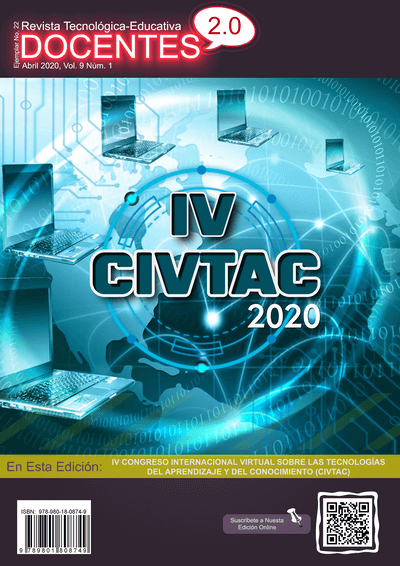Impact of the Virtual Classroom in the General Baccalaureate Student Learning Process
 DOI:
https://doi.org/10.37843/rted.v9i1.105
DOI:
https://doi.org/10.37843/rted.v9i1.105
Main Article Content
Abstract
In this investigation, I analyzed the benefits offered by a virtual classroom in the learning of the students of the general baccalaureate. For the data collection, surveys and interviews were used, for which I conducted an interview with the directors of the school, surveyed 10 teachers, in addition to 112 students, resulting in an improvement in learning. This research proposes to analyze the impact of the virtual classroom in the learning process in the students of the general baccalaureate, for the design of the virtual learning environment based on the Moodle platform. Analyzing the results, it is established that, the student must make use of the virtual classroom to acquire new knowledge to increase their academic performance, because this technological tool helps to perform autonomous works sent by teachers to complement daily tasks. We use the Moodle platform for the design of the virtual classroom, which allows: Distribute information, exchange ideas, experiences, apply, experience what has been learned, evaluate knowledge, and maintain both security and reliability in the System. It is also concluded that using the virtual classroom the student can build their own knowledge based on previous knowledge, thanks to the simple use of technology and computer applications.
Downloads
Metrics
Article Details

This work is licensed under a Creative Commons Attribution-NonCommercial-NoDerivatives 4.0 International License.
Those authors who have publications in our journal accept the following terms:
- When a work is accepted for publication, the author retains rights of reproduction, distribution of his/her article for exploitation in all countries of the world in the format provided by our magazine and any other magnetic medium, optical, and digital.
- Authors will retain their copyright and guarantee the journal the right first to publish their work, which will be simultaneously subject to the Creative Commons Acknowledgment License (Attribution-NonCommercial-NoDerivatives 4.0 International (CC BY-NC-ND 4.0)). That allows third parties to copy and redistribute the material in any medium or format, under the following conditions: Acknowledgment - You must properly acknowledge authorship, provide a link to the license, and indicate if any changes have been made. You may do so in any reasonable way, but not in a way that suggests you have the licensor's endorsement or receive it for your use. NonCommercial - You may not use the material for a commercial purpose. NoDerivatives - If you remix, transform, or build from the material, you cannot broadcast the modified material. There are no additional restrictions - You cannot apply legal terms or technological measures that legally restrict you from doing what the license allows.
- Authors may adopt other non-exclusive license agreements to distribute the published version of the work (e.g., deposit it in an institutional archive or publish it in a monographic volume) provided that the initial publication in this journal is indicated.
- Authors are allowed and recommended to disseminate their work through the Internet (e.g., in institutional telematic archives, repositories, libraries, or their website), producing exciting exchanges and increasing the published work's citations.
- Request of withdrawal an article has to be done in writing by the author to the Editor, becoming effective after a written response from the Editor. For this purpose, the author or authors will send correspondence via e-mail: [email protected].
- The author will not receive financial compensation for the publication of his work.
- All Docentes 2.0 Journal publications are under the Open Journal System (OJS) platform at: https://ojs.docentes20.com/.
References
Area Moreira, M., et al, (febrero 2010). Buenas prácticas de aulas virtuales en la docencia universitaria semipresencial. Revista Teoría de la Educación. Educación y Cultura en La Sociedad de la Información. Vol. 11, n. 1, pp. 7-31.
Bernal Torres, C. (2010). Método y metodología en la investigación científica. En Fernández Palma, O. (Tercera ed.), Bogotá: Metodología de la investigación administración, economía, humanidades y ciencias sociales (58-60). Pearson.
Conseco Guerrero, E. G. (2013). Aplicación de una aula virtual en moodle, como apoyo didáctico para la asignatura de física y laboratorio del tercer año de [Tesis de Maestría, Pontificia Universidad Católica del Ecuador Sede Ambato]. http://repositorio.pucesa.edu.ec/handle/123456789/782
Díez Fernández, O., y Acosta Barros, L. (2011). Las TIC en la enseñanza - aprendizaje en las Canarias: una aproximación a través de experiencias docentes. En Sáinz Peña, R. (Primera ed.). Experiencias educativas en las aulas del siglo XXI. Innovación con TIC (291-297). Ariel.
Domjan, M. (2010). Definición de Aprendizaje. En Islas Licona Claudia. (Sexta ed.). Principios de aprendizaje y conducta (17). Cengage Learning.
Gervasoni, A., et al. (2013). Aula virtual en un ciclo básico universitario: el caso de la Fce-UnaM. Revista Ciencia y Tecnología. n. 19, pp. 5-12.
Guzmán, G. (2020). Re: Didáctica crítica: características y objetivos. Una propuesta que consiste en desarrollar alumnos capaces de pensar por sí mismos. https://psicologiaymente.com/desarrollo/didactica-critica
Lechuga, M. (2014). Utilización de Entornos Virtuales Educativos y Recursos Educativos Abiertos (OpenCourseWare) en cursos de Ingeniería Química de la Universidad de Granada. Revista Formación Universitaria. Vol. 7, n. 4, pp. 3-14.
Macías Álvarez, D. (2010). Plataformas de enseñanza virtual libres y sus características de extensión: Desarrollo de un bloque para la gestión de tutorías en Moodle. [Proyecto Fin de carrera, Universidad de Alcalá]. http://www3.uah.es/libretics/files/Tutorias.pdf
Martínez de Lahidalga, I. (2008). Moodle, la plataforma para la enseñanza y organización escolar. Revista Ikastorratza e-Revista de Didáctica. n. 2, pp. 1-12.
Mendoza, M. (2018). El Aprendizaje a través de la Percepción como Estrategia. https://www.ayp.org.ar/project/el-aprendizaje-a-traves-de-la-percepcion-como-estrategia-2/
Merchán Feijoo, M., y Vallejo Bajaña, J. (2010). Nuevo enfoque en la evaluación de los aprendizajes, en el área de matemáticas, para estudiantes de cuarto año de educación básica. [Tesis de Licenciatura, Universidad de Cuenca]. http://dspace.ucuenca.edu.ec/handle/123456789/1858
Moodle.org. (2 de agosto de 2014). Re: Acerca de Moodle. [Consulta en línea]. https://docs.moodle.org/27/en/About_Moodle.
Núñez Rojas, N. (2009). Elementos esenciales que componen el Aula Virtual. En Núñez Rojas, N. La Webquest, el aula virtual y el desarrollo de competencias para la investigación en los estudiantes del I ciclo de educación – USAT (65-69). Universidad Católica Santo Toribio de Mogrovejo.






